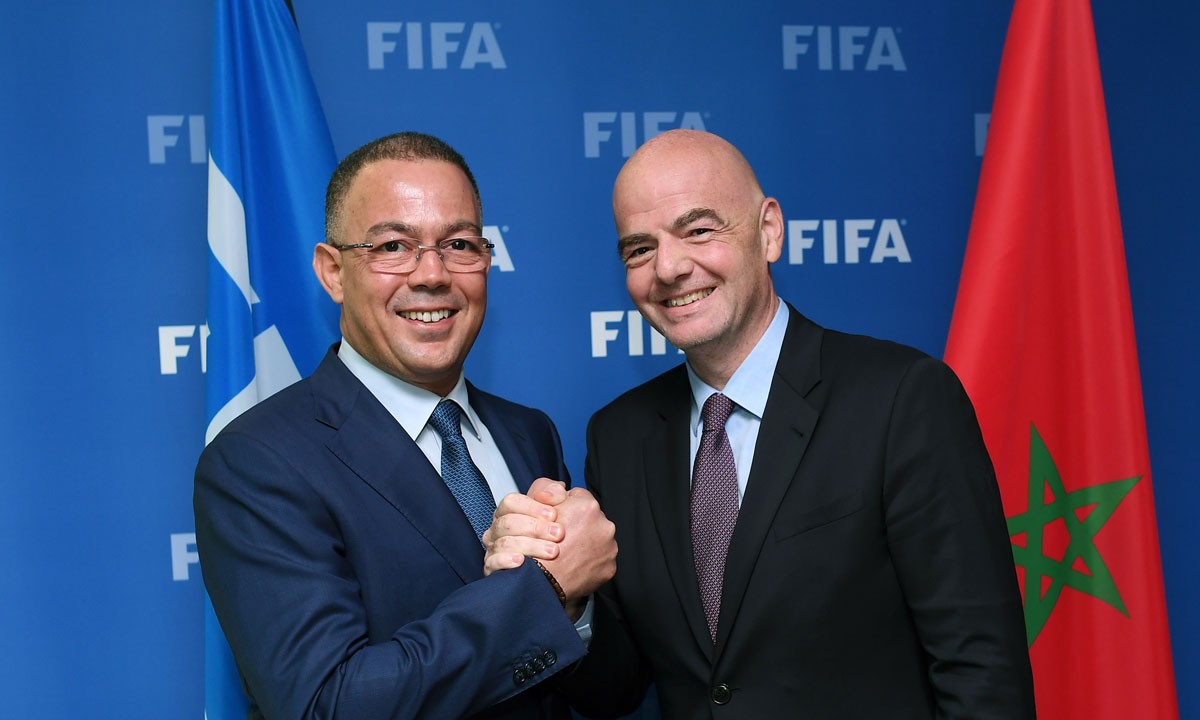


Marrakech - FIFA officials met with South American football leaders in New York this week to discuss a formal proposal to expand the 2030 World Cup to 64 teams.
The suggestion, first raised by Uruguayan Football Federation president Ignacio Alonso during the "any other business" section of a FIFA council meeting in March, has sparked debate across global football.
The meeting at Trump Tower included FIFA president Gianni Infantino, CONMEBOL president Alejandro Dominguez, and the presidents of the Argentine, Paraguayan, and Uruguayan football associations.
Paraguayan president Santiago Pena and Uruguayan president Yamandu Orsi also attended, while Argentine president Javier Milei was notably absent, meeting with US President Donald Trump instead.
"We want to call for unity, creativity, and believing big," said Dominguez in a social media post. "Because when football is shared by everyone, the celebration is truly global."
The pace of World Cup expansion has accelerated dramatically over the decades. The tournament maintained a 16-team format until expanding to 24 teams in 1982, then to 32 teams in 1998.
Next summer's competition in North America will feature 48 teams, and if this latest proposal is approved, the 2030 tournament would see the World Cup doubling in size in just eight years.
The 2030 edition is already set to make history as the first World Cup spread across three continents. Spain, Portugal, and Morocco will be the main hosts, with Argentina, Uruguay, and Paraguay hosting opening-round matches to commemorate the tournament's origins in Uruguay in 1930.
A 64-team World Cup would mean more than 30% of FIFA's 211 member nations would participate. It would feature 128 matches, compared to the 104 games planned for the 2026 tournament and the 64 matches in the 2022 Qatar World Cup.
The tournament structure would likely feature 16 groups of four teams, with the top two from each group advancing directly to the knockout stage.
CONMEBOL is pushing hardest for the expansion. It argues the expansion would be a fitting tribute to mark the World Cup's centenary. "It cannot pass by as just another event; it cannot be a normal World Cup," Dominguez stated. "We see this as a once-in-a-100-year opportunity."
Currently, up to seven of South America's ten nations can qualify for the 2026 World Cup. The confederation is eager to secure more meaningful participation in 2030, as FIFA's hosting rules mean South America would be locked out from primary hosting duties until at least 2042 after the centenary tournament.
'It is a bad idea'
Not everyone supports the idea. UEFA president Aleksander Ceferin has firmly opposed the plan. "This proposal was maybe even more surprising for me than you," he told reporters in April. "It is a bad idea. It is not a good idea for the World Cup itself, and it's not a good idea for our qualifiers as well."
CONCACAF president Victor Montagliani echoed these concerns: "We haven't even kicked the ball for the 48-team format. They can study all they want, but it just doesn't feel right."
Similarly, AFC president Sheikh Salman rejected the proposal, stressing the 2030 edition was already set at 48 teams. "If the issue remains open... someone might demand 132 teams," he warned in April. "Where would we end up then? It would become chaos."
Critics raise concerns about competitive balance, warning that one-sided matches could affect the tournament's quality. According to FIFA rankings, the 64th-ranked team globally is Burkina Faso - a side that has never qualified for a World Cup and recently lost to Tanzania (107th), Madagascar (108th), and Mauritania (110th).
Behind the scenes, FIFA sources express doubts about the proposal's viability. "Gianni would not get that vote through Council even if he wanted to," one FIFA source told The Guardian.
"The overwhelming feeling around the table - and not just in Europe - is that 64 teams would damage the World Cup. There'd be too many uncompetitive matches, and it would risk damaging the business model."
The expansion would also impact broadcasting revenues. Under the 48-team format, 72 of 104 matches (69.2%) will be group-stage fixtures. A 64-team tournament would increase this to 96 of 128 matches (75%). If these games prove uncompetitive, both broadcasters and FIFA could be dissatisfied with the product.
Qualification logistics also remain unclear, particularly regarding how many additional spots each confederation would receive.
To add to the pushback, environmental concerns have also been raised. The 2030 tournament is already set to have the largest carbon footprint of any World Cup in history due to its multi-continental format, which critics say breaches FIFA's commitment to net-zero emissions by 2040 and halving them by 2030.
While Infantino told the South American delegation, "Today, we really start working together as a team to make history," enthusiasm among South American officials has been palpable. Yet FIFA maintains that no decision has been made.
Any expansion would require approval from the FIFA Council, which meets at least twice yearly, though the issue is not on the agenda for next month's meeting in Zurich. If approved, the World Cup would be expected to return to 48 teams for the 2034 tournament.
Your email address will not be published. Required fields are marked *
No comments yet. Be the first to comment!